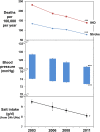Salt reduction in England from 2003 to 2011: its relationship to blood pressure, stroke and ischaemic heart disease mortality
- PMID: 24732242
- PMCID: PMC3987732
- DOI: 10.1136/bmjopen-2013-004549
Salt reduction in England from 2003 to 2011: its relationship to blood pressure, stroke and ischaemic heart disease mortality
Abstract
Objectives: To determine the relationship between the reduction in salt intake that occurred in England, and blood pressure (BP), as well as mortality from stroke and ischaemic heart disease (IHD).
Design: Analysis of the data from the Health Survey for England.
Setting and participants: England, 2003 N=9183, 2006 N=8762, 2008 N=8974 and 2011 N=4753, aged ≥16 years.
Outcomes: BP, stroke and IHD mortality.
Results: From 2003 to 2011, there was a decrease in mortality from stroke by 42% (p<0.001) and IHD by 40% (p<0.001). In parallel, there was a fall in BP of 3.0±0.33/1.4±0.20 mm Hg (p<0.001/p<0.001), a decrease of 0.4±0.02 mmol/L (p<0.001) in cholesterol, a reduction in smoking prevalence from 19% to 14% (p<0.001), an increase in fruit and vegetable consumption (0.2±0.05 portion/day, p<0.001) and an increase in body mass index (BMI; 0.5±0.09 kg/m(2), p<0.001). Salt intake, as measured by 24 h urinary sodium, decreased by 1.4 g/day (p<0.01). It is likely that all of these factors (with the exception of BMI), along with improvements in the treatments of BP, cholesterol and cardiovascular disease, contributed to the falls in stroke and IHD mortality. In individuals who were not on antihypertensive medication, there was a fall in BP of 2.7±0.34/1.1±0.23 mm Hg (p<0.001/p<0.001) after adjusting for age, sex, ethnic group, education, household income, alcohol consumption, fruit and vegetable intake and BMI. Although salt intake was not measured in these participants, the fact that the average salt intake in a random sample of the population fell by 15% during the same period suggests that the falls in BP would be largely attributable to the reduction in salt intake rather than antihypertensive medications.
Conclusions: The reduction in salt intake is likely to be an important contributor to the falls in BP from 2003 to 2011 in England. As a result, it would have contributed substantially to the decreases in stroke and IHD mortality.
Keywords: England; blood pressure; cardiovascular mortality; dietary salt.
Figures
Comment in
-
Repeating the success of the salt reduction programme.BMJ. 2016 Nov 16;355:i6079. doi: 10.1136/bmj.i6079. BMJ. 2016. PMID: 27852599 No abstract available.
Similar articles
-
Effect of longer-term modest salt reduction on blood pressure.Cochrane Database Syst Rev. 2013 Apr 30;(4):CD004937. doi: 10.1002/14651858.CD004937.pub2. Cochrane Database Syst Rev. 2013. PMID: 23633321 Review.
-
Effect of longer term modest salt reduction on blood pressure: Cochrane systematic review and meta-analysis of randomised trials.BMJ. 2013 Apr 3;346:f1325. doi: 10.1136/bmj.f1325. BMJ. 2013. PMID: 23558162 Review.
-
Salt intake, blood pressure and cardiovascular disease mortality in England, 2003-2018.J Hypertens. 2023 Nov 1;41(11):1713-1720. doi: 10.1097/HJH.0000000000003521. Epub 2023 Aug 23. J Hypertens. 2023. PMID: 37723900
-
Estimating the potential contribution of stroke treatments and preventative policies to reduce the stroke and ischemic heart disease mortality in Turkey up to 2032: a modelling study.BMC Public Health. 2016 Jan 19;16:46. doi: 10.1186/s12889-015-2655-8. BMC Public Health. 2016. PMID: 26781488 Free PMC article.
-
Estimation of salt intake by urinary sodium excretion in a Portuguese adult population and its relationship to arterial stiffness.Rev Port Cardiol. 2006 Sep;25(9):801-17. Rev Port Cardiol. 2006. PMID: 17100171 English, Portuguese.
Cited by
-
Targeted Approaches: Choosing Sodium Reduction Methods Based on Salt Usage Habits.Nutrients. 2024 Aug 23;16(17):2816. doi: 10.3390/nu16172816. Nutrients. 2024. PMID: 39275134 Free PMC article.
-
Global, regional, and national burden of stroke attributable to diet high in sodium from 1990 to 2019: a systematic analysis from the global burden of disease study 2019.Front Neurol. 2024 Aug 14;15:1437633. doi: 10.3389/fneur.2024.1437633. eCollection 2024. Front Neurol. 2024. PMID: 39206294 Free PMC article.
-
Effects of salt intake reduction by urinary sodium to potassium ratio self-monitoring method.Hypertens Res. 2024 Jul;47(7):1852-1860. doi: 10.1038/s41440-024-01655-1. Epub 2024 Apr 10. Hypertens Res. 2024. PMID: 38600280 Clinical Trial.
-
Multisectoral action to address noncommunicable diseases: lessons from three country case studies.Front Public Health. 2024 Feb 21;12:1303786. doi: 10.3389/fpubh.2024.1303786. eCollection 2024. Front Public Health. 2024. PMID: 38450149 Free PMC article. Review.
-
The Jamaica Salt Consumption Study Protocol: Sodium Intake; Sodium Content in Restaurant Foods; Knowledge, Attitudes, and Practices; Spot Urine Sodium Validation.F1000Res. 2023 Nov 24;11:721. doi: 10.12688/f1000research.122619.2. eCollection 2022. F1000Res. 2023. PMID: 38264475 Free PMC article.
References
-
- World Health Organization. Global status report on noncommunicable diseases 2010. http://whqlibdoc.who.int/publications/2011/9789240686458_eng.pdf (accessed 29 Oct 2013)
-
- World Health Report 2002. Reducing risks, promoting healthy life. Geneva, Switzerland: World Health Organisation, 2002. www.who.int/whr/2002 (accessed 3 Jun 2013) - PubMed
-
- Health Survey for England. http://www.hscic.gov.uk/catalogue/PUB09300 (accessed 16 Jan 2014)
Publication types
MeSH terms
Substances
LinkOut - more resources
Full Text Sources
Other Literature Sources
Medical
Research Materials

